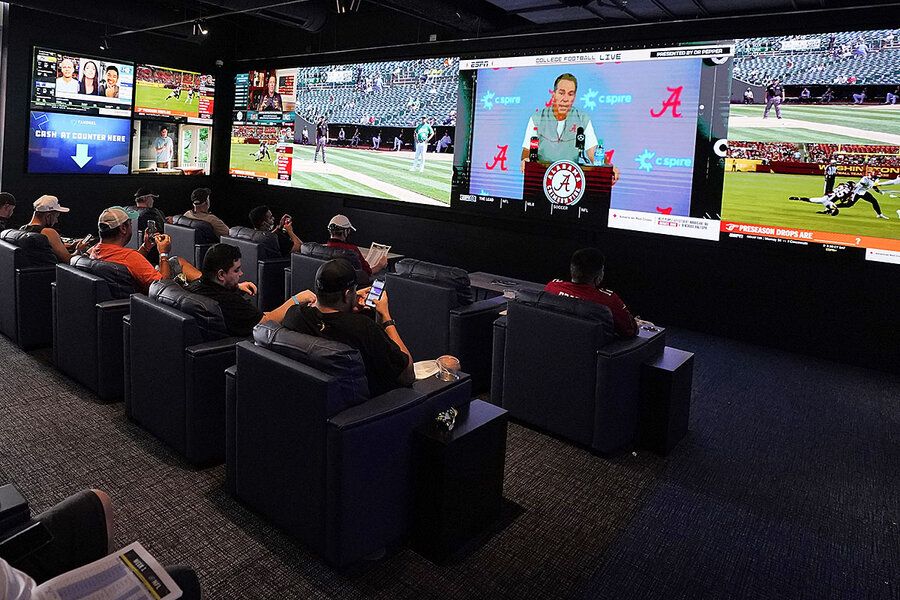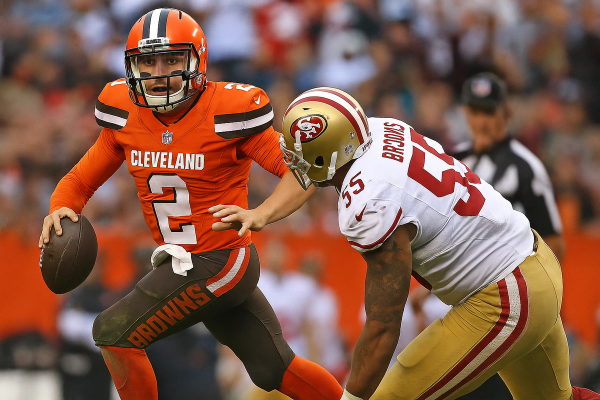The Social Media Spiral: How X Hype Manipulates Your Bets


James White
Co-Founder of HotTakes
Scroll through X (formerly Twitter) during any major sporting event and you'll see the same pattern playing out in real-time. Confident predictions, dramatic hot takes, viral upset calls, and an endless stream of people telling you exactly what to bet. The engagement is intoxicating, the certainty is contagious, and your bankroll is about to take a massive hit.
Here's what nobody wants to admit: social media has created the perfect ecosystem for destroying betting discipline. The platform rewards bold predictions over accurate ones, amplifies emotional reactions over analytical thinking, and creates echo chambers where bad betting advice spreads faster than any fact-check can contain it.
While you're getting hyped up by viral takes and following the crowd into consensus plays, sharp money is quietly doing the opposite. They're fading the public sentiment that social media amplifies, exploiting the line movement that Twitter hype creates, and profiting from the systematic biases that online communities can't help but generate.
The Algorithm Wants You to Lose
Social media platforms are designed to maximize engagement, not accuracy. A boring but correct prediction gets buried. A bold, dramatic take that's probably wrong gets amplified to millions. The algorithm doesn't care about your betting results. It cares about keeping you scrolling, clicking, and arguing.
This creates a fundamental misalignment between what performs well on social media and what performs well in sports betting. The takes that go viral are usually the ones that trigger emotional responses, confirm existing biases, or make dramatic predictions. These are exactly the kinds of takes that lead to poor betting decisions.
The worst part? The algorithm learns what gets you engaged and feeds you more of the same. If you interact with underdog content, you'll see more underdog hype. If you engage with parlays, you'll get buried in parlay suggestions. The platform is literally training you to make worse betting decisions by feeding you the content that triggers your worst impulses.
Every like, retweet, and reply is teaching the algorithm how to manipulate you more effectively. You think you're just engaging with sports content, but you're actually building a personalized pipeline of bad betting advice tailored specifically to your psychological weaknesses.
The Influencer Incentive Problem
Betting influencers on social media face a brutal economic reality: they get paid for engagement, not accuracy. A controversial take that goes viral is worth infinitely more than a quietly correct prediction that nobody shares.
This creates perverse incentives where influencers are financially motivated to make dramatic predictions regardless of their actual confidence in those predictions. That "lock of the century" isn't a lock at all. It's engagement bait designed to build their following, and you're the one paying the price when it loses.
The tracking problem makes this worse. Most followers don't verify long-term records. They remember the viral wins and forget the quiet losses. An influencer can go 3-12 on their last 15 picks, but if those three wins were loud and dramatic, their reputation stays intact while their followers' bankrolls evaporate.
Even influencers with good intentions get corrupted by the incentive structure. When their boring, accurate content gets ignored but their wild predictions go viral, the platform is literally training them to prioritize engagement over accuracy. Over time, even well-meaning analysts start making bolder, less reliable predictions because that's what the algorithm rewards.
Social Proof and the Herd Mentality
Humans are hardwired to trust the wisdom of crowds. When you see thousands of people agreeing on a take, your brain automatically assumes there's something valid about it. This social proof instinct served our ancestors well but destroys modern bettors.
The problem is that social media crowds aren't actually wise. They're self-selecting groups of people who share similar biases, often with zero professional betting experience, amplifying each other's worst instincts in real-time. That consensus you're seeing isn't market intelligence. It's groupthink wearing the disguise of wisdom.
This creates the illusion of certainty around bets that are actually high-risk propositions. When your entire timeline is talking about how the Chiefs are going to destroy their opponent, it feels like a safe bet. In reality, what you're seeing is public sentiment that's probably already baked into an inflated line.
Sharp bettors understand that when everyone on social media agrees on something, that's usually a signal to look the other way. The crowd isn't wrong about everything, but they're wrong often enough that fading consensus social media plays is a legitimate long-term strategy.
The Highlight Reel Effect
Social media betting culture is built around celebrating wins and hiding losses. Every winning ticket gets posted with fire emojis and celebration. Every losing ticket gets quietly deleted or ignored. This creates a completely distorted view of what sustainable betting actually looks like.
Scrolling through betting content on X makes it seem like everyone is winning constantly. Massive parlays hitting, live betting heroics paying off, and underdog stories coming through. What you don't see is the iceberg of losses hiding beneath that curated highlight reel.
This selective reporting warps your perception of achievable results. When you see someone posting their fifth winning day in a row, you don't know about the two losing weeks that preceded it. When you see a huge parlay hit, you don't see the 50 failed parlays that came before it.
The psychological impact is brutal. You start thinking your own results are disappointing because you're comparing them to an artificially curated feed of other people's best moments. Your realistic 53% hit rate feels like failure when everyone else appears to be hitting 80%, even though those 80% claims are statistically impossible to maintain.
The Narrative Trap
Sports social media loves a good story, and nothing drives engagement like a compelling narrative. The team that's due for a win. The player with something to prove. The coach on the hot seat. These storylines take over timelines and create betting consensus around them.
But here's the brutal truth: narratives are entertainment, not analysis. The fact that a story makes sense doesn't mean it will happen. Markets don't care about your narrative. They care about probability, talent, and matchup specifics.
The narrative trap is particularly dangerous because it feels like research. You're reading multiple takes about why a team is "due" or why a player is "motivated." You're seeing historical parallels and compelling arguments. It seems like you're being informed, but you're actually being emotionally manipulated.
Sharp money ignores narratives and focuses on mathematics. While social media is hyping up the revenge game angle, professionals are calculating whether that angle is actually priced into the line. Usually, if a narrative is popular enough to dominate your timeline, it's popular enough to have moved the market beyond profitability.
The Confirmation Bias Echo Chamber
Social media algorithms don't just show you random content. They show you content similar to what you've engaged with before. This creates echo chambers where your existing biases get constantly reinforced rather than challenged.
If you lean toward betting underdogs, your feed will fill with underdog success stories and anti-favorite content. If you love parlays, you'll see parlay wins everywhere. The algorithm isn't trying to make you a better bettor. It's trying to keep you engaged by showing you things you already agree with.
This confirmation bias loop is deadly for betting success. You need diverse perspectives and challenging viewpoints to make good decisions, but social media systematically filters those out in favor of content that validates your existing beliefs.
The result is that your worst betting tendencies get amplified over time instead of corrected. Every day you spend in these echo chambers makes you more confident in strategies that might be systematically unprofitable. You're not learning and evolving. You're becoming more entrenched in potentially costly patterns.
The FOMO Amplification Machine
Social media creates artificial urgency around betting decisions through Fear of Missing Out. When your entire timeline is talking about a "must-bet" game or a "can't-miss" opportunity, the pressure to get action down becomes overwhelming.
This FOMO is completely manufactured. The game was always there. The opportunity was always available. But social media makes it feel like a time-sensitive event that requires immediate action, which leads to rushed decisions without proper analysis.
The live betting social media spiral is particularly brutal. Real-time reactions to plays create constant FOMO moments where you feel like you need to bet right now or miss out on value. In reality, most of these "opportunities" are either already priced in or represent variance rather than genuine edge.
Smart bettors have predetermined frameworks for what they bet and when they bet it. Social media FOMO attacks those frameworks by creating emotional pressure to deviate from your system. Every time you make a bet because your timeline made you feel like you'd miss out otherwise, you're letting the algorithm override your discipline.
Recency Bias on Steroids
Social media takes the natural human tendency toward recency bias and amplifies it to absurd levels. Whatever happened in the last game dominates discussion about the next game, regardless of whether that recent performance is predictive or just normal variance.
A quarterback has one great game and suddenly your timeline is convinced he's ascended to a new level. A team blows a lead and social media declares them mentally weak. These overreactions to recent events create consensus opinions that are usually wrong and often create value opportunities on the other side.
The problem is that social media makes these recency-based narratives feel like breakthrough insights rather than obvious overreactions. When hundreds of people are independently reaching the same conclusion about a recent performance, it seems like collective wisdom. Actually, it's collective recency bias being amplified by algorithmic distribution.
Professional bettors look at larger sample sizes and understand that recent games are often statistical noise rather than meaningful signals. While social media is declaring someone "washed" after two bad games or "elite" after two great games, sharp money is calculating whether short-term variance has created any actual line value.
The Fake Expert Problem
Social media gives everyone a megaphone, which means the betting advice landscape is flooded with people who have no idea what they're doing but sound confident enough to build followings. The loudest voices are rarely the most knowledgeable ones.
Distinguishing genuine expertise from confident ignorance is nearly impossible on social media. Someone with a blue checkmark and 50K followers isn't necessarily a winning bettor. They're just good at social media. But our brains don't make that distinction automatically.
This creates a dangerous situation where casual bettors are getting their information from people whose only qualification is being good at generating engagement. The advice might be terrible, but it's delivered with such confidence and amplified by such large audiences that it seems credible.
The verification problem makes this worse. Most betting influencers don't provide verifiable long-term records. They share selective winning tickets and make vague claims about their success. By the time you realize their advice is unprofitable, you've already lost money following their picks.
When Group Consensus Becomes Groupthink
There's a phenomenon in social media betting communities where dissenting opinions get shut down and consensus positions become unquestionable orthodoxy. When everyone agrees that a bet is obvious, anyone suggesting caution gets ridiculed or ignored.
This groupthink is incredibly dangerous because it eliminates the healthy skepticism that good betting requires. The community becomes so confident in their collective opinion that they stop considering alternative perspectives or potential problems with their analysis.
The escalation pattern is particularly brutal. One person makes a case for a bet. Others pile on with supporting evidence. Soon the timeline consensus is that this bet is a "lock." Anyone still on the sidelines feels like they're missing obvious value and jumps in. By the time the community consensus peaks, the line has usually moved to eliminate any actual value that existed.
Sharp bettors understand that when social media reaches overwhelming consensus on a position, that's often the time to look for value on the other side. Maximum public confidence usually correlates with minimum edge.
The Parlay Porn Epidemic
Few things get more engagement on betting social media than massive parlay tickets. Whether they're sweating to hit or celebrating a win, parlay content dominates timelines because it triggers strong emotional responses.
This constant exposure to parlays normalizes what should be considered high-risk, low-probability betting. When you see parlay tickets every time you open the app, betting straight sides starts feeling boring and conservative. The algorithm is literally training you to make worse betting decisions by glamorizing the least efficient bet types.
The mathematics of parlays are brutal. The more legs you add, the more juice you're paying and the less likely you are to win. But social media makes parlays seem like smart plays because of survivorship bias. You see the 1% that hit, not the 99% that lose.
Understanding how dopamine responses drive attraction to parlays despite terrible mathematics becomes even more important when social media is constantly feeding you parlay content designed to trigger those same dopamine responses.
Breaking Free from the Spiral
The first step to protecting yourself from social media manipulation is recognizing that your timeline is not a reliable information source for betting decisions. It's entertainment at best and algorithmic manipulation at worst.
Consider implementing a social media diet during betting seasons. Limit your exposure to betting content on X to specific times rather than constantly scrolling. The less you engage with the content, the less the algorithm can learn your weaknesses and exploit them.
When you do engage with betting content on social media, approach it with extreme skepticism. Ask yourself whether the take you're reading is designed to be accurate or designed to go viral. Look for verifiable track records rather than confident claims.
Build your own analytical frameworks independent of social media consensus. Have clear criteria for what makes a bet worth making, and don't deviate from those criteria just because your timeline is hyping something different.
Most importantly, track whether your social media-influenced bets perform differently than your independent analysis bets. Many bettors discover that their worst losses come from plays they made primarily because of social media influence rather than personal conviction.
The Professional Perspective
Professional bettors use social media very differently than recreational players. They're not looking for betting advice or hot takes. They're monitoring public sentiment to identify when consensus opinions have created line value.
When sharp players see overwhelming social media agreement on a position, they start investigating whether the contrarian side offers value. They understand that social media amplifies public bias, and public bias creates opportunities for those willing to bet against it.
The professional approach treats social media as a sentiment monitoring tool rather than an information source. What the crowd is saying matters, but not because the crowd is right. It matters because understanding crowd psychology helps identify market inefficiencies.
This doesn't mean automatically fading every popular social media take. Sometimes the consensus is correct. But it means approaching social media betting content with the question "how is this affecting the line" rather than "is this telling me what to bet."
The Mental Discipline Challenge
Perhaps the hardest part of resisting social media influence is maintaining conviction in your own analysis when your timeline is screaming the opposite. Watching everyone celebrate a play you didn't make or mock a play you did make tests your psychological fortitude in brutal ways.
This is where systematic approaches become crucial. When you have documented processes for evaluating bets, you can reference those processes when social media pressure tempts you to deviate. Your system becomes an anchor that prevents you from getting swept away by the current.
The long-term perspective matters more than daily validation. Social media operates on a 24-hour news cycle where yesterday's takes are forgotten and today's takes feel urgent. Good betting operates on a seasonal or yearly timeframe where individual days don't matter and process beats results.
Building the mental discipline to ignore social media noise while still enjoying sports content requires clear boundaries. You can participate in communities and enjoy the entertainment without letting it influence your actual betting decisions.
Bottom Line: The Timeline Isn't Your Friend
Social media is incredible for sports entertainment, community building, and sharing the excitement of games. But it's absolutely terrible for making sound betting decisions.
The sooner you recognize that your timeline is designed to manipulate your emotions rather than inform your analysis, the sooner you can protect your bankroll from algorithmic exploitation. Every viral take, every consensus play, and every influencer recommendation should be treated with extreme skepticism.
The most successful bettors build their strategies on mathematical analysis, historical data, and personal conviction. They don't need social media to tell them what to bet because they have systematic processes for identifying value independent of crowd opinion.
Your betting decisions should be made in silence, not in the noise of social media hype. Do your analysis, make your plays, and then maybe share your thoughts with the community. But never let the community or the algorithm drive your decisions.
When you find yourself about to make a bet primarily because everyone on your timeline is talking about it, that's the moment to pause and reassess. Ask yourself whether you'd still make this bet if social media didn't exist. If the answer is no, you're not betting on sports. You're betting on social proof, and that's a losing strategy every single time.
The algorithm profits when you lose discipline. The influencers profit when you follow their advice. The only person who profits when you ignore the hype and stick to your system is you. Choose wisely.

